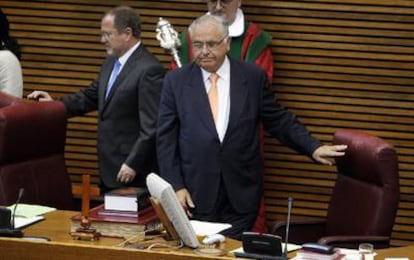Religious symbol causes unease among Valencia opposition
Newly elected speaker Juan Cotino irks colleagues with prominent display of cross
Political corruption took a seat on Thursday at the Valencian regional assembly, which opened its eighth session amid popular protests over the presence of politicians who are facing a variety of charges for alleged wrongdoing.
An additional source of friction was the decision of the newly elected speaker of the Corts Valencianes, Juan Cotino, to place a crucifix in a prominent place on his desk, raising the ire of leftist groups. This is sure to become a regular occurrence if Cotino, a member of the Opus Dei sect, decides to make a habit of displaying Catholic symbols in parliament.
While the session was underway, around 200 members of the May 15 citizen protest movement stood outside to jeer the assembly members as they walked inside the building.
The corruption suspects all sat in the area reserved for the Popular Party (PP), which won the recent regional elections of May 22 in a landslide victory despite the fact that the regional premier, the reelected Francisco Camps, is one step away from being tried for allegedly accepting expensive gifts in exchange for favoring a business ring in the awarding of government contracts.
With him were his one-time right-hand man Ricardo Costa and other suspects in the Gürtel contracts-for-kickbacks case, including first deputy premier Vicente Rambla and assembly members David Serra and Yolanda González. Besides the Gürtel case, there were other politicians present involved in the Brugal case, concerning wrongdoing in the awarding of trash-collection contracts in Alicante province. The mayor of Alicante, Sonia Castedo, and her predecessor Luis Díaz Alperi, both assembly members, are being investigated over this issue, as is an aide to Valencia mayor Rita Barberá.
In his institutional address, Camps said that the new political term should begin "with neither sterile resentment nor a will to impose." The PP obtained more than 48 percent of the vote in the May 22 elections, compared with 27.5 percent for the Socialists.
The seventh premier of the Corts Valencianes was sworn in in front of a copy of the Spanish Constitution, the regional charter, the Bible and a crucifix. The overtly religious attitude of Juan Cotino immediately angered the left-wing opposition. Representatives of Compromís and Esquerra Unida lamented the fact that the session should be presided by a religious symbol when Spain is officially "a non-denominational state."
The spokesman for the Socialist group, Jorge Alarte, however said that "fortunately, the rule of law and the regional charter guarantee every individual's right to swear, promise or express himself based on his ideas."
The crucifix has a long history in Valencian politics, as it has accompanied Cotino throughout his career, sitting on all his desks. Cotino's election means top institutional representation for the more openly Christian sector of the conservative party.
The debate over religious symbols at official events has been raging in Spain for years. After Prime Minister José Luis Rodríguez Zapatero was reelected in 2008, his top aide María Teresa Fernández de la Vega warned the Roman Catholic Church that the government would remain firm in its defense of the secular state. Yet that same day, both the Socialists and the PP voted down an initiative by the United Left and the green bloc that would have eliminated religious symbols from investiture sessions. Their argument was that such a relevant issue could not be imposed by minority groups.
A year and a half later, in December 2009, Congress asked the executive to remove religious symbols from schools, this time with support from the Socialist Party. Last year it looked like the law would be reformed to accommodate these demands, but in November Zapatero himself announced a freeze due to a lack of consensus.
Spain is not the only European country where religious symbols are a controversial issue. In March of this year, the European Court of Human Rights ruled in favor of the Italian state, considering that the presence of crosses in public schools did not violate parents' rights to educate their children according to their own convictions. The ruling is not binding for other countries, but it does set a precedent for similar cases that might reach the European court in future.

Tu suscripción se está usando en otro dispositivo
¿Quieres añadir otro usuario a tu suscripción?
Si continúas leyendo en este dispositivo, no se podrá leer en el otro.
FlechaTu suscripción se está usando en otro dispositivo y solo puedes acceder a EL PAÍS desde un dispositivo a la vez.
Si quieres compartir tu cuenta, cambia tu suscripción a la modalidad Premium, así podrás añadir otro usuario. Cada uno accederá con su propia cuenta de email, lo que os permitirá personalizar vuestra experiencia en EL PAÍS.
¿Tienes una suscripción de empresa? Accede aquí para contratar más cuentas.
En el caso de no saber quién está usando tu cuenta, te recomendamos cambiar tu contraseña aquí.
Si decides continuar compartiendo tu cuenta, este mensaje se mostrará en tu dispositivo y en el de la otra persona que está usando tu cuenta de forma indefinida, afectando a tu experiencia de lectura. Puedes consultar aquí los términos y condiciones de la suscripción digital.








































